Papers by Esther Monzó-Nebot
Critical approaches to institutional translation and interpreting: Challenging epistemologies, 2024
The final chapter situates the knowledge created by the chapters in this volume within the framew... more The final chapter situates the knowledge created by the chapters in this volume within the framework of reformist movements that aim at enhancing the diversity of research practices across their different stages. The novel research questions and concerns explored throughout the chapters are highlighted, and epistemological issues are discussed. The key research questions are presented as part of plural agendas to keep filling in the blanks of institutional translation and interpreting studies. The chapter encourages researchers to take the inroads suggested throughout the chapter to explore new land that has the potential to challenge prevailing epistemologies in a number of domains.

Just. Journal of Language Rights & Minorities, Revista de Drets Lingüístics i Minories, 2023
This contribution serves as the introductory framework for the articles featured in the special i... more This contribution serves as the introductory framework for the articles featured in the special issue of Just Journal of Language Rights & Minorities, Revista de Drets Lingüístics i Minories exploring the intersections between ideologies and language rights. The article navigates through fundamental concepts, contending that prevailing ideologies within societies play a pivotal role in legitimizing inequalities among social identities, often within legal frameworks. The introduction underscores the historical and dynamic nature of social configurations that establish relationships of dominance among collective identities. Within this contextual backdrop, language emerges as a potent symbol, embodying the identification of social groups and encapsulating the conflicts that arise between them. The article concludes by highlighting the significance of the published articles in fostering a dialogue that brings to light the impact of language ideologies and of the varied manifestations of language rights on the acceptance of inequalities among social identities—an initial stride towards their eventual rejection.

Sostenibilidad y postexcepcionalidad desde las ciencias humanas y sociales: prácticas y propuestas en el marco de la Agenda 2030, 2023
En este capítulo se acota la significación de la Agenda 2030 de las Naciones Unidas en la labor c... more En este capítulo se acota la significación de la Agenda 2030 de las Naciones Unidas en la labor colectiva de conceptualización de la justicia social como base del desarrollo huma-no. Asimismo, se problematizan algunos aspectos referidos a la génesis y la negociación de los Objetivos de Desarrollo Sostenible (ODS) para destacar que, si bien el sistema internacional manifiesta claramente la indivisibilidad de los derechos civiles, políticos, sociales, económicos y culturales, la materialización de los ODS conserva concepciones inoperativas que perpetúan las jerarquías a nivel internacional y, con ello, injusticias a nivel local. Este capítulo hace hincapié en la visión de la Agenda 2030 como proceso descentralizado y abierto y en la función del mundo académico para interrogar su implementación. En particular, se expone el potencial de las ciencias humanas y sociales a través de los aportes realizados en los capítulos que componen el monográfico.
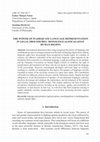
Jezik, književnost, moć / Language, Literature, Power, 2023
International instruments have long recognized the power of languages and established measures to... more International instruments have long recognized the power of languages and established measures to mitigate and prevent the harm of language deprivation. Indeed, linguistic rights have increasingly been recognized as human rights. In a number of contexts, the effective realization of the most basic linguistic rights depends on the translation from a minority to a dominant language. Legal proceedings are an example, and the European Convention on Human Rights (Article 6) enshrines the right to interpretation and translation for those who do not speak or understand the language of the proceedings. However, monolingual ideologies still loom large on societies, resulting in a number of inadequacies that deprive the speakers of languages socially classified as minor of the necessary resources to enjoy their rights. This contribution will tackle two different contexts, Kosovo, and the Valencian country. Despite the legal obligation to avoid discrimination of speakers of non-dominant languages, judiciary practices discourage and endanger the maintenance and development of the regional and minority languages in both settings. This chapter addresses the lack of maturity of judiciary translation policies focusing on the accuracy, quality, and availability of translation, or lack thereof. In that way, we will show that from translator training to quality standards, societies' preparedness vis-à-vis their increasing diversity requires improvement.

Target, 2021
Remarkable efforts have been made in Translation and Interpreting Studies to test the subservient... more Remarkable efforts have been made in Translation and Interpreting Studies to test the subservient habitus hypothesis formulated by Simeoni (1998) in his seminal work. In the face of increasing evidence that translators tend to reproduce a given society's or community's prevalent norms and contribute to the stability of such norms (Toury 1978), subversive translation practices have been reported (Delabastita 2011; Woods 2012) and indeed promoted as a way of fostering social and cultural change (Levine 1991; Venuti 1992). However, insights into how translators' subservient or subversive habitus develop and depart from each other are still lacking. In order to shed light on this gray area, this article scrutinizes the contrasts between the habitus of professional legal translators who acquiesce to and who reject the norms governing their positions in the field. Special attention is given to those who decide to abandon the translation field. Their behavior is examined by relating habitus to forms of socialization and studying the implications of their strategies. Based on a case study drawn from interview data, this article focuses on the social practices of resistance and rebellion vis-à-vis subservience, and the impact of both on translation workplaces, work processes, and translators' futures.

International Journal for the Semiotics of Law - Revue internationale de Sémiotique juridique, 2020
This is the guest editors’ introductory paper to the special issue “Situating jurilinguistics acr... more This is the guest editors’ introductory paper to the special issue “Situating jurilinguistics across cultures using translation and discourse approaches.” The introduction showcases the interdisciplinary vocation of jurilinguistics from its conception almost forty years ago. It is argued that jurilinguistics has achieved its current maturity by diversifying the disciplinary lenses of the originally contributing disciplines of legal translation and legal studies while keeping faithful to its original principles—facing practical problems with a rigorous outlook, venturing into any new domains that may prove enlightening, and combining professional and academic perspectives. The authors highlight how the series of conferences “Jurilinguistics: Interdisciplinary Approaches to the Study of Language and Law” have been instrumental in enhancing the scope of jurilinguistics. Finally, the articles gathered in this special issue are presented and their contributions in advancing the knowledge...

International Journal for the Semiotics of Law, May 30, 2020
This is the guest editors’ introductory paper to the special issue “Situating jurilinguistics acr... more This is the guest editors’ introductory paper to the special issue “Situating jurilinguistics across cultures using translation and discourse approaches.” The introduction showcases the interdisciplinary vocation of jurilinguistics from its conception almost forty years ago. It is argued that jurilinguistics has achieved its current maturity by diversifying the disciplinary lenses of the originally contributing disciplines of legal translation and legal studies while keeping faithful to its original principles—facing practical problems with a rigorous outlook, venturing into any new domains that may prove enlightening, and combining professional and academic perspectives. The authors highlight how the series of conferences “Jurilinguistics: Interdisciplinary Approaches to the Study of Language and Law” have been instrumental in enhancing the scope of jurilinguistics. Finally, the articles gathered in this special issue are presented and their contributions in advancing the knowledge available for practitioners and scholars meeting at the interface between law and language are underscored.
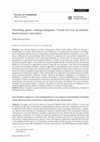
Estudios de Traducción, 2020
This paper works on the notion of transgenre (Monzó-Nebot 2001a, 2002a, b), its uses and possibil... more This paper works on the notion of transgenre (Monzó-Nebot 2001a, 2002a, b), its uses and possibilities in the study of translation as mediating intercultural cooperation. Transgenres are discursive patterns that develop in recurring intercultural situations and are recognized and used by a community. Based on the reiteration of communicative purposes and individuals’ roles in translated situations, interactions are conventionalized to streamline cooperation between cultural and social groups, thereby engendering a distinctive set of taken-for-granted assumptions and meaning-making mechanisms and signs which are particular to a translated event. The paper will first argue how this concept takes a step beyond the existing proposals from cultural, social, and linguistic approaches, especially the third space, the models of norms and laws of translation, and universals and the language of translation (translationese), by focusing on the situatedness of textual, interactional, and cultur...
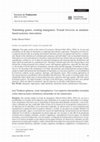
Estudios de Traducción, 2020
This paper works on the notion of transgenre (Monzó-Nebot 2001a, 2002a, b), its uses and possibil... more This paper works on the notion of transgenre (Monzó-Nebot 2001a, 2002a, b), its uses and possibilities in the study of translation as mediating intercultural cooperation. Transgenres are discursi-ve patterns that develop in recurring intercultural situations and are recognized and used by a community. Based on the reiteration of communicative purposes and individuals' roles in translated situations, interactions are conventionalized to streamline cooperation between cultural and social groups, thereby engendering a distinctive set of taken-for-granted assumptions and meaning-making mechanisms and signs which are particular to a translated event. The paper will first argue how this concept takes a step beyond the existing proposals from cultural, social, and linguistic approaches, especially the third space , the models of norms and laws of translation, and universals and the language of translation (transla-tionese), by focusing on the situatedness of textual, interactional, and cultural patterns and providing a means to model and measure the development of translation as a discursive practice, as such influenced by historical, cultural, social, cognitive, ideologic, and linguistic issues. Then existing applications of the concept and new possibilities will be identified and discussed. The results of existing studies show translations build a third space of intercultural discursive practices showing tensions with both source and target systems. The legal translator is at home in this third space, resulting from their own cultural practices, which are linked to translators' specific function in a broader multicultural system. [es] Traducir géneros, crear transgéneros: Los espacios intermedios textuales como innovaciones sistémicas enraizadas en las situaciones Resumen. Este artículo trabaja la noción de transgénero (Monzó-Nebot 2001a, 2002a, b), sus usos y posibilidades en el estudio de la traducción como mediadora en la cooperación intercultural. Los transgé-neros son patrones discursivos que se desarrollan en situaciones interculturales recurrentes y son recono-cidos y utilizados por una comunidad. Sobre la base de la reiteración de los propósitos comunicativos y las funciones de los individuos en las situaciones traducidas, las interacciones se convencionalizan para racionalizar la cooperación entre los grupos culturales y sociales, lo que genera un conjunto distintivo de supuestos asumidos, signos y mecanismos de creación de significado que son particulares de una situación traducida. En el artículo se argumentará en primer lugar que este concepto va más allá de las propuestas existentes de los enfoques culturales, sociales y lingüísticos, especialmente el tercer espacio, los modelos de normas y leyes de la traducción, y los universales y el lenguaje de la traducción (translationese), al cen-trarse en el carácter arraigado en una situación de las pautas textuales, de interacción y culturales; por ello, proporciona un medio para modelar y medir el desarrollo de la traducción como práctica discursiva, influi-da por cuestiones históricas, culturales, sociales, cognitivas, ideológicas y lingüísticas. A continuación, se identifican y exponen las aplicaciones existentes del concepto y nuevas posibilidades. Los resultados de los estudios existentes muestran que las traducciones construyen un tercer espacio de prácticas discursivas interculturales que muestran las tensiones con los sistemas de origen y de destino. En ese tercer espacio, resultante de sus propias prácticas culturales vinculadas a la función específica de los traductores en un sistema multicultural más amplio, el traductor jurídico se siente en su propio medio. Palabras clave: transgénero, géneros jurídicos, traducción jurídica, normas de traducción, lenguaje de la traducción, tercer espacio.
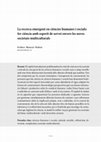
Les ciències humanes i socials. Perspectives emergents per als reptes de les societats multicultulturals, 2020
The introductory chapter problematizes the conception of science as reflected in cultural product... more The introductory chapter problematizes the conception of science as reflected in cultural products and explores the vision of the human and social sciences as a scientific field with a strong idiosyncrasy inherited from the objects of study they analyze. Grounded on the commitment to create knowledge in a systematic and transparent way, those engaged in the human and social sciences have historically demonstrated a strong innovative spirit while keeping committed to rigor. They have designed forms of knowledge and developed perspectives that give us reliable and productive information on the human condition and on the human being as connected to others and to his or her environment. This chapter emphasizes the capacity required by these sciences to simultaneously manage different forms of knowledge and to constantly reflect on their own involvement, as individuals, in the creation of knowledge, from the selection of objects to possible biases in inference. The necessary reflexivity, for the individual who researches and the community that legitimizes science, is also the best way to manage our future societies, which are multicultural and increasingly diverse.
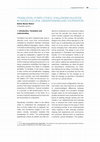
Linguapax Review, 2020
This paper explores the power of translation to shape our collective and personal experience with... more This paper explores the power of translation to shape our collective and personal experience with strangeness, and the constraints imposed on its possibilities by social hierarchies and dominating discourses. Emphasizing the cultural and social dimensions of translation policies, the paper focuses on issues of ethics, specifically on the models available for translators to understand their real impact and possibilities for agency against the myth of neutrality. Becoming aware of the ideological nature of the taken-for-granted assumptions of translation increases translators’ possibilities while challenging their assumed role in specific cultures and situations. A final reflection on the implications of the issues considered for different social groups leads to a desideratum for further research on how translation and translation policies are shaping inequalities in our current world.
Translation and Interpreting Studies, Jun 5, 2020
This introduction to the special issue “Ethics of non-professional translation and interpreting” ... more This introduction to the special issue “Ethics of non-professional translation and interpreting” reviews the rather marginal role of non-professional interpreting and translation (NPIT) in the evolution of interpreting and translation studies (ITS) against the surge of interest for this persistent form of translation and interpreting. The guest editors invite readers to consider the possibilities of studying NPIT to answer basic questions as to what is right and wrong in translation and interpreting.
Introduction to the special issue Ethics of Non-Professional Translation and Interpreting, published in Translation and Interpreting Studies 15.1.
https://www.jbe-platform.com/content/journals/10.1075/tis.00046.int
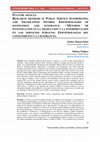
FITISPos, 2020
How disciplines approach their objects of inquiry is a result of their epistemological traditions... more How disciplines approach their objects of inquiry is a result of their epistemological traditions, which include decisions about what they choose to examine and what they decide to ignore. As an interdiscipline, Interpreting and Translation Studies (ITS) was born to overcome the limits of discipline-specific approaches to translation and interpreting, and when observing complex real-life phenomena, examining issues through an interdisciplinary lens can reveal things that approaches from single disciplines on their own would miss. This feature article reviews how ITS has shaped Public Service Interpreting and Translation (PSIT), focusing specifically on the advantages and vulnerabilities that its interdisciplinary nature yields as regards research methods. Three distinctive features and their impact on research methods are examined: (1) the complexity of the object of inquiry, (2) the novelty of the disciplinary field that aims to scrutinize and to explain PSIT, and (3) the changes that the social sciences in general have undergone and are currently undergoing, opening up new opportunities for research practices and methodological reflections. Contemplations of these features reveal issues identified and the efforts undertaken to tackle them in relation to the internal and external validity of research studies as well as unexplored strengths and roadblocks in the path towards achieving a critical mass of studies that can adequately represent the relevance of PSIT in contemporary societies.

Revista de Llengua i Dret, 2019
This monographic section of the Revista de Llengua i Dret, Journal of Language and Law presents t... more This monographic section of the Revista de Llengua i Dret, Journal of Language and Law presents the findings of six critical perspectives on translation and interpreting policies and practices in modern societies that pose challenges for public institutions. Taking a critical and empirical stance, the papers provide data and reflections on how language access is critical to fulfilling fundamental rights and ensuring the ability of institutions to implement their mandates effectively. The introductory article reviews the role of public services in present-day multilingual societies and of translation and interpreting in relation to the policies governing language access. It goes on to review conflicting implicit theories of translation and interpreting by providing a brief discussion of the roles prescribed and described for translators and interpreters. Finally, it proceeds to present the papers, which are constructed around two axes: (a) an examination of practices capable of provi...
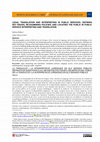
Revista de Llengua i Dret, 2019
This monographic section of the Revista de Llengua i Dret, Journal of Language and Law presents t... more This monographic section of the Revista de Llengua i Dret, Journal of Language and Law presents the findings of six critical perspectives on translation and interpreting policies and practices in modern societies that pose challenges for public institutions. Taking a critical and empirical stance, the papers provide data and reflections on how language access is critical to fulfilling fundamental rights and ensuring the ability of institutions to implement their mandates effectively. The introductory article reviews the role of public services in present-day multilingual societies and of translation and interpreting in relation to the policies governing language access. It goes on to review conflicting implicit theories of translation and interpreting by providing a brief discussion of the roles prescribed and described for translators and interpreters. Finally, it proceeds to present the papers, which are constructed around two axes: (a) an examination of practices capable of providing evidence for policy redesign and reform; and (b) a fundamental review of the role of public service interpreting and translation (PSIT) itself, conducted by means of comparative studies which examine the needs and perceptions of PSIT in various domains, and the challenges of training in the face of emerging realities. Resum Aquesta secció monogràfica de la Revista de Llengua i Dret, Journal of Language and Law presenta els resultats de sis perspectives crítiques sobre els reptes que plantegen per a les institucions públiques les polítiques i les pràctiques de traducció i interpretació en les societats modernes. Amb una mirada crítica i empírica, els articles que s'hi recullen ofereixen dades i reflexions sobre la importància de la disponibilitat lingüística en el gaudi de drets fonamentals i en possibilitar que les institucions executin el seus mandats amb eficiència. L'article introductori revisa la funció dels serveis públics en les actuals societats multilingües, i també de la traducció i la interpretació en el marc de les polítiques que regeixen la disponibilitat lingüística. Tot seguit, examina teories més o menys implícites, sovint contradictòries, de la traducció i la interpretació amb un breu debat sobre les funcions que s'atribueixen, de forma prescriptiva o descriptiva, a traductores i intèrprets. Finalment, es presenten els articles de la secció monogràfica, que s'estructuren al voltant de dos eixos: a) una revisió de pràctiques que forneix dades per a la definició i la reforma de les polítiques públiques, i b) una revisió fonamental de la funció mateixa de la traducció i la interpretació en els serveis públics (TISP) a través d'estudis que ofereixen comparatives de les necessitats i de les percepcions de la TISP en àmbits diversos, com també dels reptes que ha d'afrontar la formació davant les realitats emergents.











Uploads
Papers by Esther Monzó-Nebot
Introduction to the special issue Ethics of Non-Professional Translation and Interpreting, published in Translation and Interpreting Studies 15.1.
https://www.jbe-platform.com/content/journals/10.1075/tis.00046.int
Introduction to the special issue Ethics of Non-Professional Translation and Interpreting, published in Translation and Interpreting Studies 15.1.
https://www.jbe-platform.com/content/journals/10.1075/tis.00046.int
Monzó-Nebot, Esther and Melissa Wallace. 2020. "Research methods in public service interpreting and translation studies: Epistemologies of knowledge and ignorance." FITISPos International Journal 7: 15-30.
Aguilar Solano, Maria. 2020. "Triangulation and Trustworthiness —Advancing Research on Public Service Interpreting through Qualitative Case Study Methodologies." FITISPos International Journal 7: 31-52.
Herring, Rachel E. and Elisabet Tiselius. 2020. "Making the Most of Retrospective Process Tracing in Dialogue Interpreting Research." FITISPos International Journal 7: 53-71.
Lomeña Galiano, María. 2020. "Finding Hidden Populations in The Field of Translating and Interpreting: A Methodological Model for Improving Access to Non-Professional Translators and Interpreters Working in Public Service Settings." FITISPos International Journal 7: 72-91.
Mellinger, Christopher D. 2020. "Positionality in Public Service Interpreting Research." FITISPos International Journal 7: 92-109.
Vuori, Jaana and Sari Hokkanen. 2020. "Empirical Designs in PSIT Studies." FITISPos International Journal 7: 110-137.
Aquest llibre presenta una revisió dels enfocaments de la traducció jurídica que posa l’èmfasi en quina és la comprensió subjacent de les jerarquies socials i la funció de la traducció i la interpretació a l'hora de perpetuar o equilibrar les diferències de poder entre grups socials, inclosos els que es distingeixen per la llengua. A partir d'una revisió dels principis dels enfocaments estructurals i funcionals, l'aparició dels estudis descriptius sobre traducció es contextualitza en el marc de la institucionalització de la disciplina. El volum presenta l'evolució dels estudis de traducció i interpretació des de posicions apolítiques cap al compromís social com a influïda per la revolució silenciosa dels valors mundials. En aquest context, els canvis introduïts en els enfocaments postcolonials i descolonials s'il·lustren amb exemples concrets de traducció i interpretació jurídiques. La distinció entre traducció ascendent i traducció descendent s’amplia a les jerarquies socials i, des d’aquesta distinció, el volum descriu els procediments de traducció jurídica i, sobre aquesta base, se centra en intervencions específiques en traducció i interpretació jurídiques (especialment jurades i judicials) per analitzar les normes socials que marquen els límits de la traducció i la interpretació en distints camps. El llibre, basat en materials desenvolupats per l'autora per a la formació en traducció judicial, destaca el potencial de la traducció i la interpretació jurídiques per adaptar-se i contribuir als canvis socials adoptant un enfocament interseccional i un habitus cooperatiu.
La recerca emergent en ciències humanes i socials: fer ciència amb esperit de servei envers les noves societats multiculturals
Esther Monzó-Nebot
To be or not to be: Bridging diverging positions in the case of Charlie Hebdo
Irina Charlotte Ranaivosoa
In defence of the Republic: La Vanguardia’s plea for multicultural unity in the Spanish Civil War
Samantha N. Edwards
La justicia transicional en perspectiva: los casos de Argentina, Colombia y Sudáfrica
Camilo Eduardo Espinosa Díaz
Considering degrowth from a feminist, transrational peace perspective
Marisol C. Bock
The focus on interculturality: A quantitative and qualitative bibliometric study on legal interpreting research
Ana Vázquez Fernández
Problemes en la traducció de musicals: estratègies i tècniques per resoldre’ls
Joan Alfred Noll Obiol
El adorno en estuco en la Valencia de 1700: de las propuestas autóctonas a la eclosión de la profesión
Gaetano Giannotta
Estereotipos de género, elección de estudios universitarios y práctica deportiva competitiva en una muestra de deportistas CADU
de la Universitat Jaume I
Jahel Molina Ulldemolins, M. Carmen Pastor Verchili, María Escrig Mateu, Carlos Hernando Domingo, Sonia Reverter Bañón
Un programa de intervención en psicología positiva para aumentar el bienestar de los docentes
Marisa García Baldán
Introducció, Esther Monzó Nebot i Juan Jiménez Salcedo 1
Justice as a guiding principle? Considering the values of working
principles for interpreters, Gernot Hebenstreit 5
Quintessence Service Ideal: the role of the client’s best interest
in interpreting studies, Mediha Ohranovic 15
La humanidad minorizada: el contacto personal como competencia,
M. Luisa Rodríguez Muñoz 31
La traducción de la variedad geográfica minorizada: responsabilidad y
ética desde la deconstrucción, Núria Molines Galarza 45
Translating for Ethnic Linguistic Minorities: A Study on the Translation
Policy in the Judicial System in China, Shuang Li 57
La versión web en español de los organismos federales de los Estados
Unidos. ¿Un intento de desminorización lingüística?,
Leticia Moreno Pérez 71
La traducción y la enseñanza de lenguas de herencia: una aproximación
a la experiencia traductora (EN-ES) de hispanohablantes bilingües
en los Estados Unidos, Laura Gasca Jiménez 89
La Reunió: regular l’educació per destruir una llengua,
Lourdes Frasquet Porta 105
La audiodescripción. O la desminorización como derecho, Raquel Sanz 121
La representació audiovisual del multilingüisme en els processos
de migració
i diàspora, Irene de Higes Andino 137
Conference Interpreters: How to serve the cause of minorized
communities in the new postmonolingual / ‘postmonodiscoursive’
order, Ana Isabel Leal Lobato 151
La representación de los intérpretes de tribunales en los medios
españoles: una lucha jurisdiccional silenciada, Doris Zörweg 167
Disculpe señoría, soy intérprete de lengua de signos: diseño de un
protocolo de observación de la propiocepción de intérpretes de lengua
de signos en tribunales, Belén Pérez Senra 181
Estrategias de gestión del estrés en el ámbito de la interpretación para los servicios públicos: Comparación de intérpretes naturales y profesionales
en la interpretación en hospitales, Ibrahim Hassan 195
Drets lingüístics, seguretat lingüística i subsidiarietat lingüística a la Universitat Jaume I, Maties Segura Sabater 209
Eines i recursos jurídics per a la traducció cap al català: dels tipus
de recursos a les necessitats dels usuaris, Ona Domènech i Cristina Gelpí 221
El Comitè Terminològic de Dret i el portal Terminologia jurídica:
recursos de consens per a l’accés a la justícia en català, Elisabeth
Casademont i Apel·les Carod 235
Intérpretes sin certificación en los tribunales: Estudio de caso,
Mariela Zambrano 253
Translating for immigrants and refugees in Valencia: The role
of translators and interpreters in their access to the public service,
Najat Sijilmassi 265
El valor dels avantatges que ofereix expressar-se i rebre les comunicacions en la llengua o llengües en què més competència tenim subjau al disseny i l’execució de les polítiques, però no s’ha materialitzat en el reconeixement d’un dret universal. Ans al contrari, continua establint jerarquies, entre llengües, comunitats i individus. La llengua és una categoria d’estratificació social que estableix l’accés a les esferes en què articulem la vida social. La capacitat d’arranjar aquest accés es troba associada al capital acumulat de les llengües. Quan s’instrumenta activament, hi veiem fluxos ininterromputs de traducció i interpretació. En les negociacions interestatals, no s’hi escassegen recursos i el dret a usar la llengua que pot donar més avantatges discursius no es discuteix. En l’altre extrem, les persones que migren per motius econòmics, polítics i ecològics acaren entorns altament institucionalitzats i profundament desconeguts sense cap garantia de comprensió i, molt menys, avantatge de negociació. Entre els dos escenaris, s’obri un panorama divers de situacions on s’invaliden i s’entronitzen determinats capitals lingüístics vinculats a les estructures que organitzen la distribució de recursos i de drets.
FITISPos International Journal – Número especial, vol. 7 (2020)
Métodos de investigación en traducción e interpretación en los servicios públicos: Ampliar y profundizar en la recopilación, el análisis y la difusión de los datos
Editoras invitadas:
Esther Monzó Nebot, Universitat Jaume I, España
y Melissa Wallace, University of Texas at San Antonio, Estados Unidos
Research methods in public service interpreting and translation:
Expanding and exploring the collection, analysis and diffusion of data
Guest Editors:
Esther Monzó Nebot, Universitat Jaume I, Spain
and Melissa Wallace, University of Texas at San Antonio, United States
Volume 15, Issue 1
Special issue: The Ethics of Non-Professional Translation and Interpreting in Public Services and Legal Settings
Guest Editors: Esther Monzó-Nebot (Universitat Jaume I, Spain) and Melissa Wallace (University of Texas at San Antonio, United States)
We welcome critical and empirical proposals for this special thematic issue on research methods in PSIT to be published in April 2020. The guest editors invite contributions including but not limited to the following lines of research:
• Assessing the quality of research in PSIT;
• Research methods in specific domains of PSIT;
• Open access and open research methods in PSIT;
• Teaching and learning research methods in PSIT;
• Interdisciplinarity and research methods in PSIT;
• Ethical requirements of research methods in PSIT;
• Empiricism in PSIT research;
• Technology at the service of research methods in PSIT;
• Action research and the role of translators and interpreters in PSIT research;
• Innovations in PSIT research methods;
• Methods to achieve scientific, social and political impact of research in PSIT.
Prospective authors are invited to send their paper proposals in the form of abstracts of 250-350 words (excluding references) in MS Word format to the guest editors by June 30th, 2019:
Esther Monzó Nebot: monzo@uji.es
Melissa Wallace: melissa.wallace@utsa.edu
Hans Peter Willberg y Friedrich Forssman ponen a disposición del lector, profesional y no profesional, consejos básicos de fácil comprensión y lectura amena. Con este libro, los autores introducen al usuario no especializado en el mundo del diseño gráfico y le familiarizan con los problemas cotidianos que el uso de la tipografía conlleva.
Això no obstant, en els darrers anys moltes àrees del sector públic han perdut aquesta singularitat i han esdevingut cada vegada més semblants al sistema laboral general. Significa això que el concepte d'un funcionariat públic com a estructura específica ha quedat obsolet, si més no en alguns països?